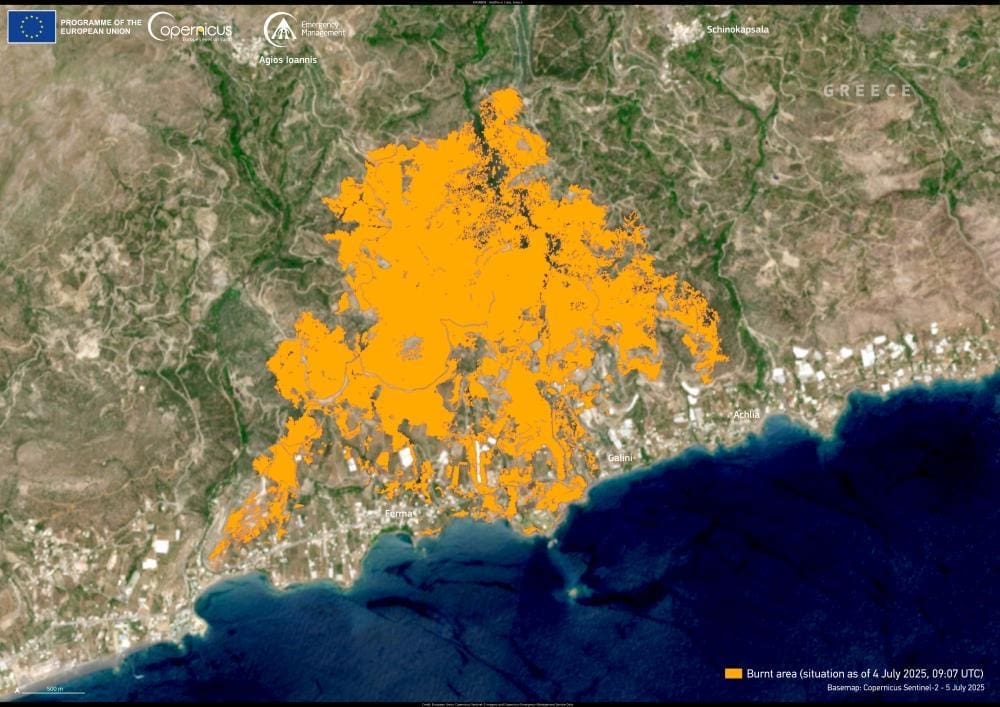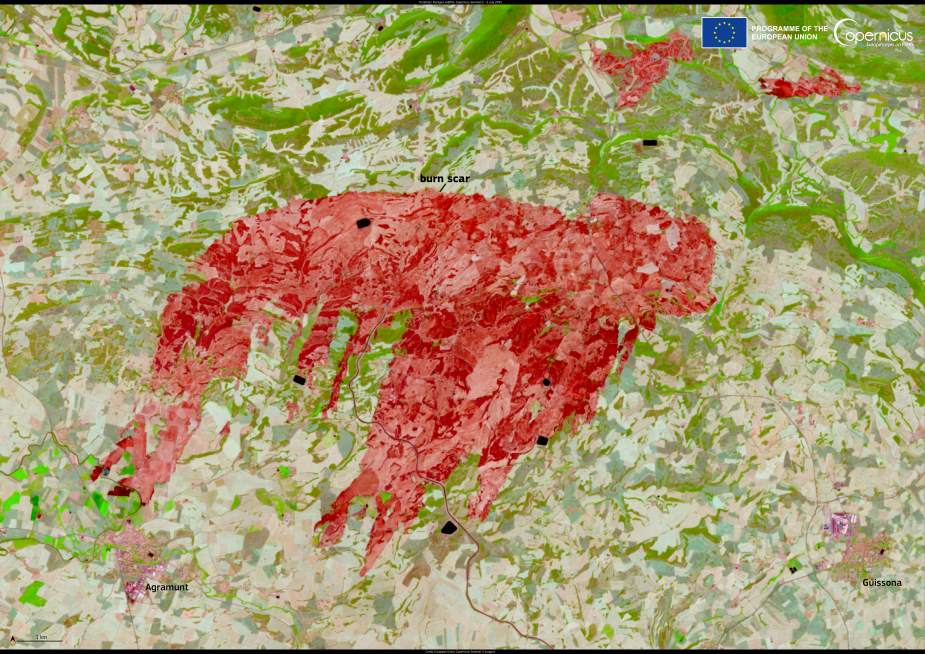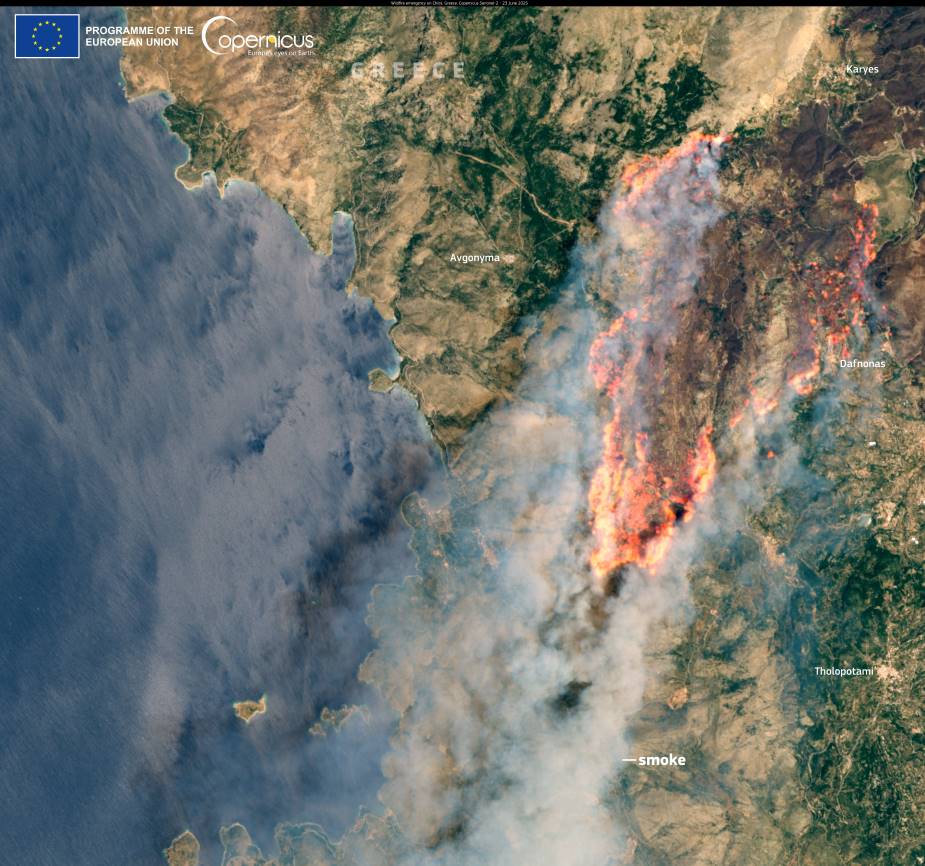
EU environment ministers test blood for ‘forever chemicals’News SourceJuly 10, 2025
Full article
SourceJuly 10, 2025
Full article
EU environment ministers test blood for ‘forever chemicals’
Copenhagen, Denmark | AFP EU environment and climate ministers meeting in Denmark on Thursday tested their blood for "forever chemicals" linked to serious health risks, in…

Image of the day: Dramatic retreat of Iceland’s Skeiðarárjökull glacierNews Muser NewsDeskJuly 9, 2025
Full article
Muser NewsDeskJuly 9, 2025
Full article
Image of the day: Dramatic retreat of Iceland’s Skeiðarárjökull glacier
The Skeiðarárjökull glacier in southern Iceland is visibly retreating, as shown in Copernicus Sentinel-2 satellite images captured on 26 July 2017 and 6 July 2025.…

Deadly China-Nepal flood caused by glacial lake: expertsNews SourceJuly 9, 2025
Full article
SourceJuly 9, 2025
Full article
Deadly China-Nepal flood caused by glacial lake: experts
Kathmandu, Nepal | AFP Flash floods that killed at least nine people in a mountainous region between China and Nepal and swept away a key bridge…

Image of the day: Crete wildfire forces mass evacuations amid gale-force windsNews Muser NewsDeskJuly 8, 2025
Full article
Muser NewsDeskJuly 8, 2025
Full article
Image of the day: Crete wildfire forces mass evacuations amid gale-force winds
Thousands of residents and tourists have been forced to flee homes and hotels after a major wildfire started burning across eastern Crete. The blaze began…

Almost half of Europe and Mediterranean basin hit by droughtNews SourceJuly 8, 2025
Full article
SourceJuly 8, 2025
Full article
Almost half of Europe and Mediterranean basin hit by drought
Paris, France | AFP Europe and the Mediterranean basin has been hit by a long-lasting drought covering over 45 percent of the region since mid-March, according…

ETH Zurich receives 100 million francs to launch Earth observation centre in LucerneNews Muser NewsDeskJuly 8, 2025
Full article
Muser NewsDeskJuly 8, 2025
Full article
ETH Zurich receives 100 million francs to launch Earth observation centre in Lucerne
Zurich, Switzerland | ETH Zurich | Muser NewsDesk ETH Zurich is set to establish a major centre for Earth observation, backed by a 100 million…

Image of the day: Clear view of Norway’s widest fjord from spaceNews Muser NewsDeskJuly 7, 2025
Full article
Muser NewsDeskJuly 7, 2025
Full article
Image of the day: Clear view of Norway’s widest fjord from space
Bjørnafjorden, Norway’s widest fjord, cuts deep into the coastline of Vestland county, stretching around 30 kilometers long and up to 10 kilometers wide. Formed by…

Desperate search for the missing as more than 80 people dead in Texas floodsNews SourceJuly 7, 2025
Full article
SourceJuly 7, 2025
Full article
Desperate search for the missing as more than 80 people dead in Texas floods
Hunt, United States | AFP | Muser NewsDesk Rescuers in Texas raced against time to find dozens of missing people, including children, swept away by flash…

Image of the day: Burn scar from wildfire near Bizanet, FranceNews Muser NewsDeskJuly 6, 2025
Full article
Muser NewsDeskJuly 6, 2025
Full article
Image of the day: Burn scar from wildfire near Bizanet, France
A wildfire near the town of Bizanet in southern France scorched around 400 hectares of land after erupting on 29 June 2025. Fueled by dry…

Image of the day: Wildfire scars in Segarra, CataloniaNews Muser NewsDeskJuly 5, 2025
Full article
Muser NewsDeskJuly 5, 2025
Full article
Image of the day: Wildfire scars in Segarra, Catalonia
A fast-moving wildfire broke out on 1 July 2025 in the Segarra region of Catalonia, Spain, amid extreme winds and dry conditions. The fire spread…

Texas flood toll rises to 24 as rescuers search for missing childrenNews SourceJuly 5, 2025
Full article
SourceJuly 5, 2025
Full article
Texas flood toll rises to 24 as rescuers search for missing children
Houston, United States | AFP Rescuers were desperately searching for at least 20 girls missing from a riverside summer camp, officials said Friday, after torrential rains…

Image of the day: Scorching land temperatures track Europe’s spreading heatwaveNews Muser NewsDeskJuly 4, 2025
Full article
Muser NewsDeskJuly 4, 2025
Full article
Image of the day: Scorching land temperatures track Europe’s spreading heatwave
An intense heatwave has swept across Europe since late June 2025, with scorching land surface temperatures expanding eastward over the course of a week. The…

Heavy snow hits Turkey’s northeast as southwest burnsNews SourceJuly 4, 2025
Full article
SourceJuly 4, 2025
Full article
Heavy snow hits Turkey’s northeast as southwest burns
Istanbul, Turkey | AFP A rare blanket of heavy snow fell on parts of northeastern Turkey on Friday as the rest of the country sweltered in…

Image of the day: Soil dries out in northern FranceNews Muser NewsDeskJuly 3, 2025
Full article
Muser NewsDeskJuly 3, 2025
Full article
Image of the day: Soil dries out in northern France
As Europe endures a severe heatwave with temperatures topping 40 °C across several countries, northern France is showing signs of growing drought stress. These satellite images,…

Global drought hotspots report catalogs severe suffering, economic damage in 2023-2025News SourceJuly 3, 2025
Full article
SourceJuly 3, 2025
Full article
Global drought hotspots report catalogs severe suffering, economic damage in 2023-2025
Food, water, energy crises, human tragedies in 2023-2025 detailed in sweeping analysis Fuelled by climate change and relentless pressure on land and water resources, some…

Image of the day: Heatwave grips EuropeNews Muser NewsDeskJuly 2, 2025
Full article
Muser NewsDeskJuly 2, 2025
Full article
Image of the day: Heatwave grips Europe
Large swathes of Europe are experiencing extreme heat as a prolonged heatwave sweeps across the continent, bringing record-breaking temperatures, school closures, and rising health risks.…

EU unveils long-delayed 2040 climate target – with wiggle roomNews SourceJuly 2, 2025
Full article
SourceJuly 2, 2025
Full article
EU unveils long-delayed 2040 climate target – with wiggle room
Brussels, Belgium | AFP The EU on Wednesday unveiled its long-delayed target for cutting greenhouse gas emissions by 2040, but with contested new flexibilities built in…

ECDC launches new reports and guidance to track mosquito-borne diseases in EuropeNews SourceJuly 2, 2025
Full article
SourceJuly 2, 2025
Full article
ECDC launches new reports and guidance to track mosquito-borne diseases in Europe
As Europe enters this year’s mosquito season, the European Centre for Disease Prevention and Control (ECDC) has launched a new series of weekly surveillance updates…

Effective therapies needed to halt rise in climate anxietyNews SourceJuly 2, 2025
Full article
SourceJuly 2, 2025
Full article
Effective therapies needed to halt rise in climate anxiety
More must be done to address the growth in anxiety related to climate change, says a leading psychologist, before it becomes the next mental health…

Image of the day: Snow blankets the Atacama DesertNews Muser NewsDeskJuly 1, 2025
Full article
Muser NewsDeskJuly 1, 2025
Full article
Image of the day: Snow blankets the Atacama Desert
Snowfall in the Atacama Desert is so uncommon that when it does occur, it transforms one of Earth’s driest landscapes into an unfamiliar scene. On…

Over 14 million people could die from US foreign aid cuts: studyNews SourceJuly 1, 2025
Full article
SourceJuly 1, 2025
Full article
Over 14 million people could die from US foreign aid cuts: study
Paris, France | AFP | Muser NewsDesk More than 14 million of the world's most vulnerable people, a third of them small children, could die by…

Mediterranean set new June temperature high on Sunday: French weather serviceNews SourceJune 30, 2025
Full article
SourceJune 30, 2025
Full article
Mediterranean set new June temperature high on Sunday: French weather service
Paris, France | AFP The Mediterranean Sea on Sunday hit its warmest temperature on record for June at 26.01 degrees Celsius, said a French weather service…

Image of the day: Fogo’s volcanic heart in Cape VerdeNews Muser NewsDeskJune 30, 2025
Full article
Muser NewsDeskJune 30, 2025
Full article
Image of the day: Fogo’s volcanic heart in Cape Verde
In the southern reaches of the Cape Verde archipelago, the island of Fogo rises from the Atlantic with a stark, volcanic presence. At its core…

Fires break out as southern Europe heatwave intensifiesNews SourceJune 30, 2025
Full article
SourceJune 30, 2025
Full article
Fires break out as southern Europe heatwave intensifies
Rome, Italy | AFP | Muser NewsDesk Firefighters mobilised in several countries to tackle blazes as southern Europeans sought shelter from punishing temperatures of a heatwave…
